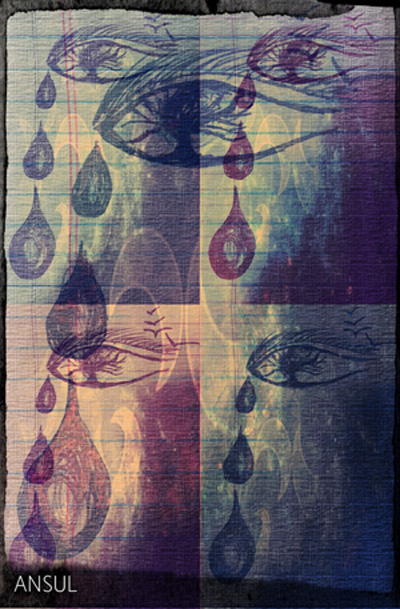I turn and look back, what do I see?
The book of life lying on the table of truth.
The cover is dusty with abandoned hope,
and the pages crumble from lack of trust.
The binding glue has lost its strength.
And fragmented pages fall upon the floor of dreams:
Dreams that in half-flight were shot from above,
now all that is left is the wish to ‘be’.
Words and sentences hide behind lost chapters.
And the writing slants then droops with age.
The midnight blue of the ink,
is now the palest shade of rain;
how beautifully the stories fade.
Excerpt from ‘Sacred Hauntings’
Poem ‘The Book’
By Ansul

1 am.
The witching hour had passed. But for us ER doctors, the hours have no name. It was a chilly October night and a Twilight-Zone calmness gripped the steely corridors of the General ER of the hospital where I worked. The fog of silence languidly crept through every examination room lending an almost dream- like air of solitude to the usually jam packed and chaotic world of trauma and emergencies.
For an ER doctor, lack of chaos can be distracting and I battled to keep my wits about me and stay busy in my head since the quiet had started to creep inside my soul as well.
Before 1 am.
I set about applying the finishing touches to a few admission notes; a man in his 50’s with liver cirrhosis, a child with febrile convulsions, and finally, a lady who had presented with an acute abdomen and anemia. With little gap between patient intakes, I scurried from one room to the other, preparing all the initial lab/diagnostic work-up and subsequent paperwork after I had decided to admit them to the ward.
Approaching 1 am.
After stabilizing my patients and sending them to their respective wards, I steadied myself and headed to the vending machine to get myself a hot cup of cocoa. It was a habit of mine — to remain on my toes until I knew that my patients were safe and secure in their beds, ready for the morning rounds. Mentally, I followed them up on their journey to recovery, and often found myself wandering into the wards the next day, checking up on how they were doing. I had been told by my superiors that this was not required of me, but I just had to know. I couldn’t break the ‘habit’ and I’m happy I didn’t.
Few minutes to 1 am.
Calmness. An eerie stillness. My fingers played with the cocoa stained cup, as I wished for answers at the bottom of it—it was tassology but without the tea leaves, just those intense spilt seconds of contemplation where everything freezes but your thought process. The ER can be an enlightening place. It teaches us about the fragility of life. It teaches us to tame our innermost fears and apprehensions so we can channel them into constructive critical thinking and hopefully save lives. It teaches us to have compassion in a mechanical setting, yet remain strong enough to handle the chaos with composure. But often, the robot of routine can seduce your mind and you can fall victim to indifference. How to retain compassion without falling apart or becoming a robot is a daily battle for the ER staff.
It’s easy being a robot, shutting it all out, moving from one case to the next and never looking back.
Therefore, we must strive to find balance.
Post 1 am
Still in a thought daze, I was jolted when my pager went off. A young lady had presented with shortness of breath and tachycardia.
Room 103 at the far end of the oddly quiet ER.
She waited for me.
I greeted her and sat down beside her. I extracted relevant medical/past history, examined her and ordered some initial bloodwork.
She mentioned that she had trouble sleeping these past few weeks and that she had lost her appetite. Other than that there were no remarkable history/findings except that she appeared anxious and afraid. I sensed it as she talked. Her eyes were blood shot from lack of sleep perhaps?
Or was it was from constant weeping?
She was well dressed and spoke eloquently, yet her voice seemed to be filled with a deep sadness that could be heard if you listened carefully.
My initial diagnosis: Depression coupled with GAD.
I held her hands and we talked about life. She told me that since her parents had passed away, she was in charge of the family business. The stress of daily life was too much bear, but most of all she was terribly lonely. She was a single local woman who was trying to survive in a male dominated society. She struggled daily to overcome sad thoughts and everyone around her had started to label her and chastise her.
No one understood this ‘invisible’ ailment. All she received were awkward stares and her so called friends seemed to disappear.
It is then I saw two glistening tears stain her cheeks.
“Doctora, I wish I had met you before.â€
“You are the only one who really wanted to know how I felt, I feel much better now.â€
What she required was the medicine of compassion.
I explained the benefits of psychotherapy and that she must follow-up with a psychiatrist. I referred her to a good friend of mine who would be able to help her through the struggles of life.
To which she responded:
“Will that doctor have the gift of kindness?â€
“I only need that.â€
The Next Day
As with most ER tales — I never saw that lady again. But she left an impression on my mind for years to come. Often, the only action required of a doctor is a kind word, a genuine interest in the ‘invisible pains’ of another. If you forget your humanness, you forget your oath, and soon you will forget your ‘self’.
Might have I behaved in a similar fashion if I were swamped with patients?
Only my conscience can be the judge of that.
Nothing in this profession is beyond the call of duty. Every encounter is special and requires a unique protocol tailor designed to the situation.
Depression and mental illness is greatly misunderstood even today. Core principals of treatment should include patience, care and empathy, and of course medication as needed. It can be challenging to devote time and effort to such issues in an ER or busy OPD setting, but all you have to do is administer generous doses of genuineness to cure that moment of anguish and loneliness.
Mental illness is a hard thing and there is no greater medicine than knowing that there is someone out there who cares.
I’m sure we have all had such moments-in-practice that may have influenced the way we conduct ourselves with our patients and that allowed us to explore the metaphysical meaning of being a ‘true healer’.
A medical degree does not make you a healer— The journey does.
Discharge Summary
Genuine words can change or save a life. It’s a much needed soulful resuscitation, for both, the sufferer and the healer.
By Ansul Noor
‘Beyond Duty’

Hola Ansul,
Some thoughts on Beyond Duty, an E.R. story.
In this gripping story, I sensed the eerie calm of the Emergency Room on a chilly October night at 1 am. I felt the doctor’s state of mind as she puts finishing touches on admission notes and scurries from one room to another to prepare lab workups. She is an E.R. doctor trying to keep busy on a quiet night, immersed in her duties, yet affected by the fragility of life. She contemplates her own innermost fears, hoping to learn how to face “chaos with composure” in order to save lives.
Ansul Noor has captured the E.R. in words so sure, I felt transported to that place and moment in time. In touching scenes with a depressed patient, she shows the importance of compassion in the medical profession, transforming science and empathy into true healing. Great work, Ansul. You are a Doctor and a Poet.